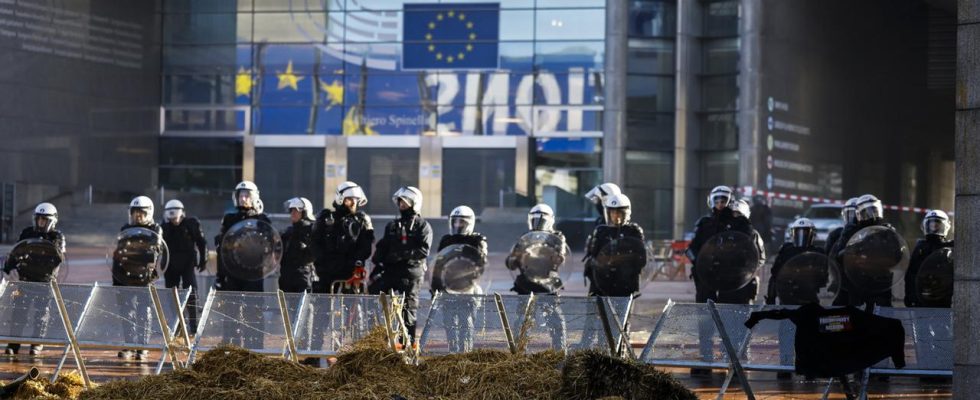The 27 heads of state and government will once again discuss relief for farmers and support for Ukraine at the EU summit in Brussels. Further questions are likely to become controversial.
The noise of tractors and the wailing of sirens have been the accompaniment to meetings of leading EU politicians in Brussels for weeks. Farmers also want to mobilize at the summit of heads of state and government. The EU Commission has already announced far-reaching concessions that the member states still have to agree to. Brussels wants to abolish controls for small businesses and weaken environmental regulations. The obligation to set aside part of the arable land in order to protect species should also remain suspended in the coming years.
In Germany, France, Poland, the Netherlands and Belgium, farmers have demonstrated against the policies of their governments and the EU in recent months. They complain about falling income, too much bureaucracy and further requirements due to new environmental regulations from Brussels. In Germany, farmers took to the streets against the planned removal of tax exemptions for agricultural diesel. In France and Poland they are protesting against the fall in prices caused by imports from Ukraine. Just this week, member states and the EU Parliament agreed to limit duty-free imports of certain Ukrainian agricultural products. If large quantities of eggs, poultry or sugar come into the EU from there, tariffs will be due again.
Weapons aid from interest income?
As has been the case at virtually all EU summits since Russia’s war of aggression in Ukraine began a good two years ago, President Volodymyr Zelenskyj will be joining in via video. He is likely to make an urgent appeal to the 27 EU states to supply more weapons and ammunition. The summit discusses where the money should come from. At the beginning of the week, the EU foreign ministers gave the green light to increase a fund outside the EU budget by five billion euros, which will be used to pay for weapons and equipment for Ukraine.
In addition, the EU Commission wants to use interest income for military aid that accrues on assets of the Russian central bank that are frozen in the EU. Brussels expects possible revenue of three billion euros annually. However, this requires a unanimous decision from the member states. Chancellor Olaf Scholz is in favor of it. The debate about this is only likely to begin at the EU summit.
More money for defense
The heads of state and government want to fundamentally discuss how they can increase Europe’s arms production and provide more money for defense in the face of the Russian threat. In his invitation letter, EU Council President Charles Michel emphasized that Europe had invested too little in its security and defense for decades. Now it is high time for radical and concrete steps.
France’s proposal to take on joint debt, as was the case during the corona pandemic, is controversial. Germany rejects such plans. But the member states want to use Europe’s development bank more for defense. The European Investment Bank (EIB) is already supporting the development of drones and the expansion of border security. But it is only allowed to promote dual-use goods, i.e. products that can be used for civil and military purposes. Their mandate excludes the financing of weapons and ammunition. The summit could call on the EIB to revise the criteria for dual-use items to give the defense industry better access to private and public finance.
Controversies in Bosnia-Herzegovina…
A week and a half ago, the EU Commission recommended starting accession negotiations with Bosnia-Herzegovina. Commission head Ursula von der Leyen justifies this with what she sees as impressive reform progress. Her agency’s country report from last November sounded different. Germany, Austria and Italy also want to bring the Balkan state closer to the EU, just as the EU did with Ukraine and Moldova.
Last December, the heads of state and government agreed in principle to accession talks with both countries. But the negotiating mandate is still missing. In the case of Bosnia, however, France and the Netherlands have expressed concerns. From Paris’ perspective, the time is not yet ripe for accession negotiations. The summit can only give the green light unanimously.
… and in the debate about Gaza
The EU also remains divided over the Gaza war. Some member states such as Spain and Ireland are calling for Israel to be criticized more harshly in view of the many Palestinian victims. The EU states will discuss with UN Secretary-General Antonio Guterres, among other things, the role of the Palestinian aid organization UNRWA. Israel accuses individual employees of being involved in the Hamas attack in early October. Germany and other countries have therefore stopped their payments to the aid organization.
Scholz reaffirmed his unwavering solidarity with Israel in the Bundestag and declared that Germany would not deviate from its principles in supporting the country. At the same time, he also pointed out the suffering of the Palestinian civilian population to Israeli Prime Minister Netanyahu. It is possible that the EU summit will not produce a common declaration on the Gaza war because of the different perspectives, as was the case in December.

